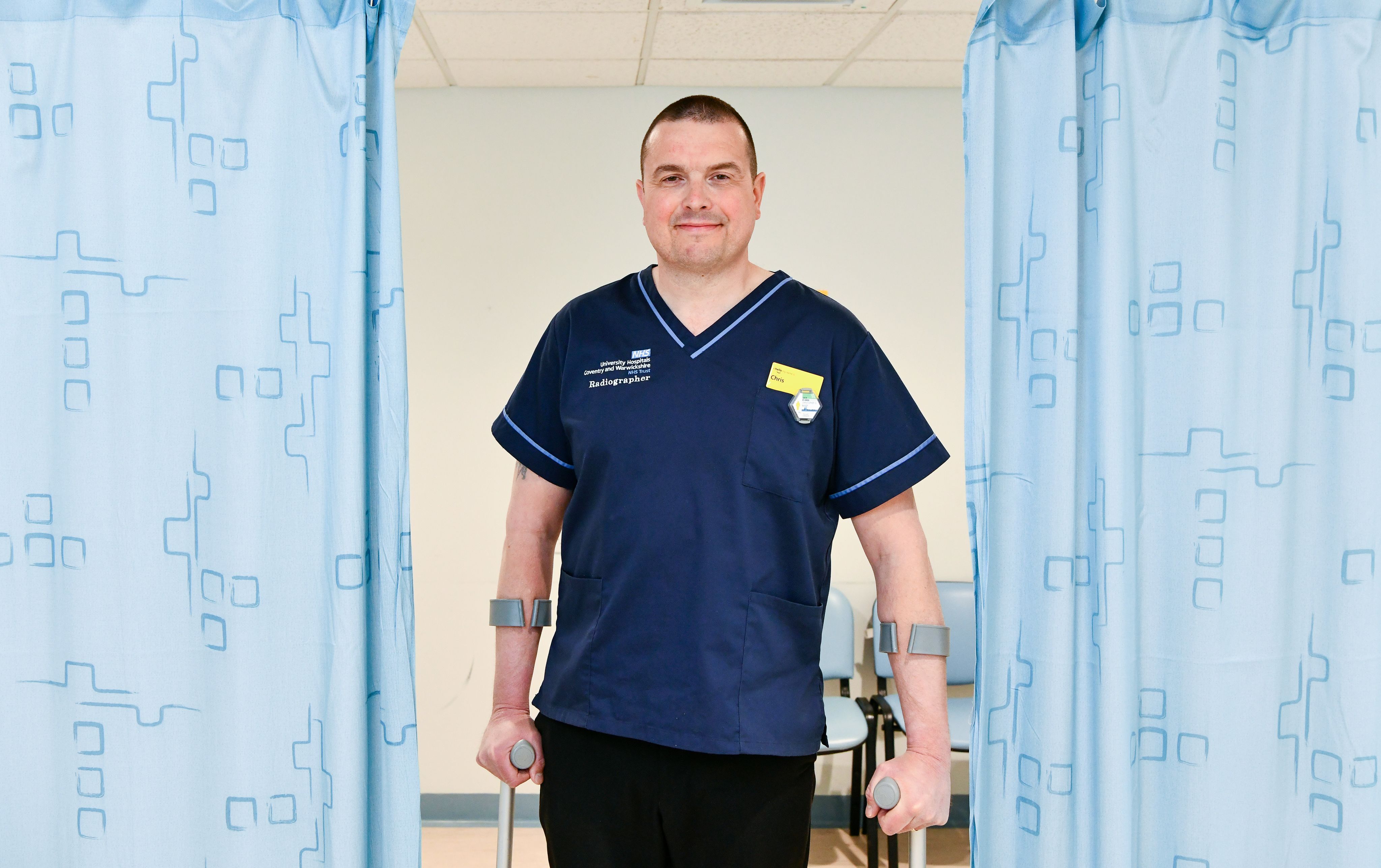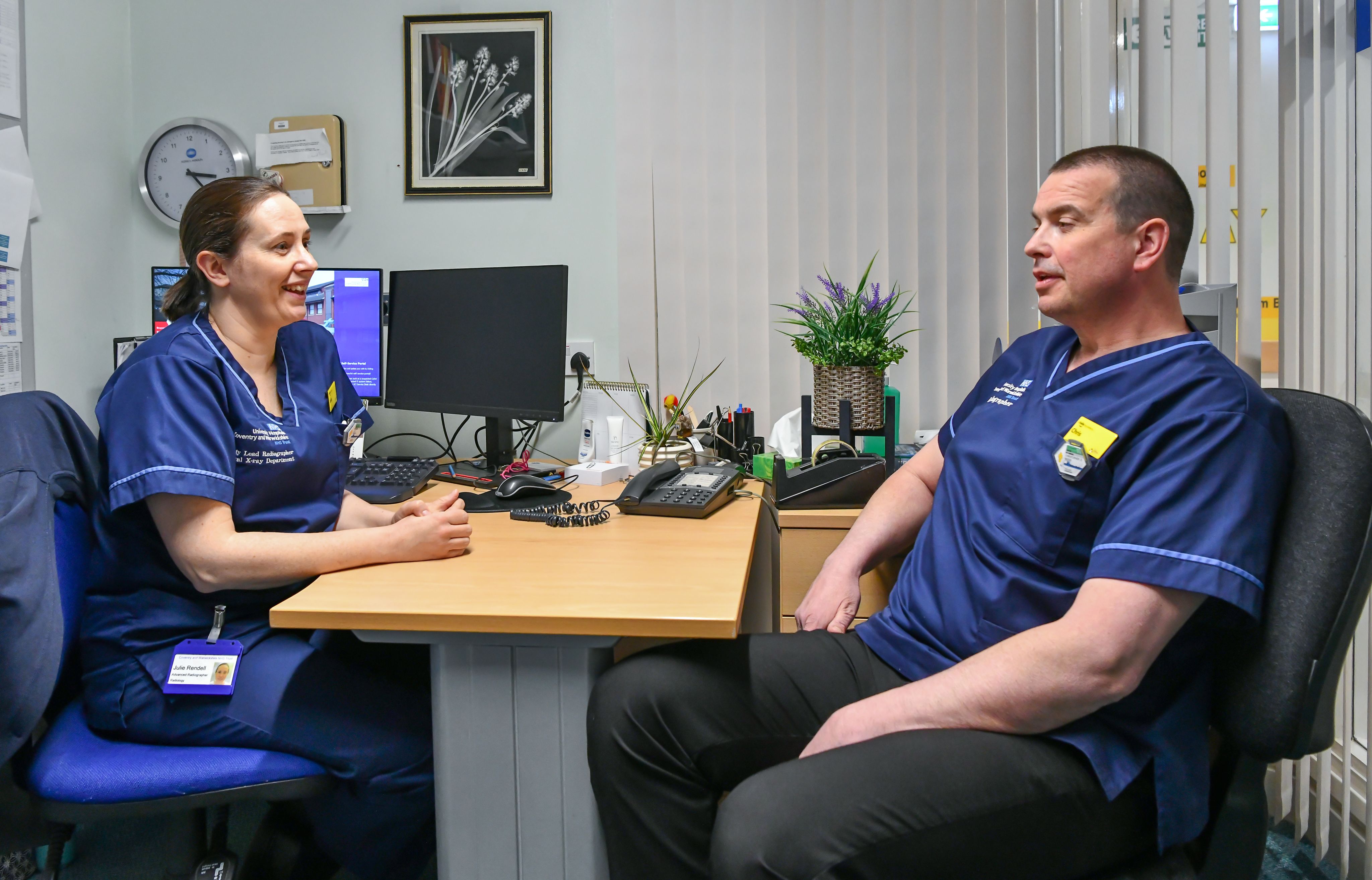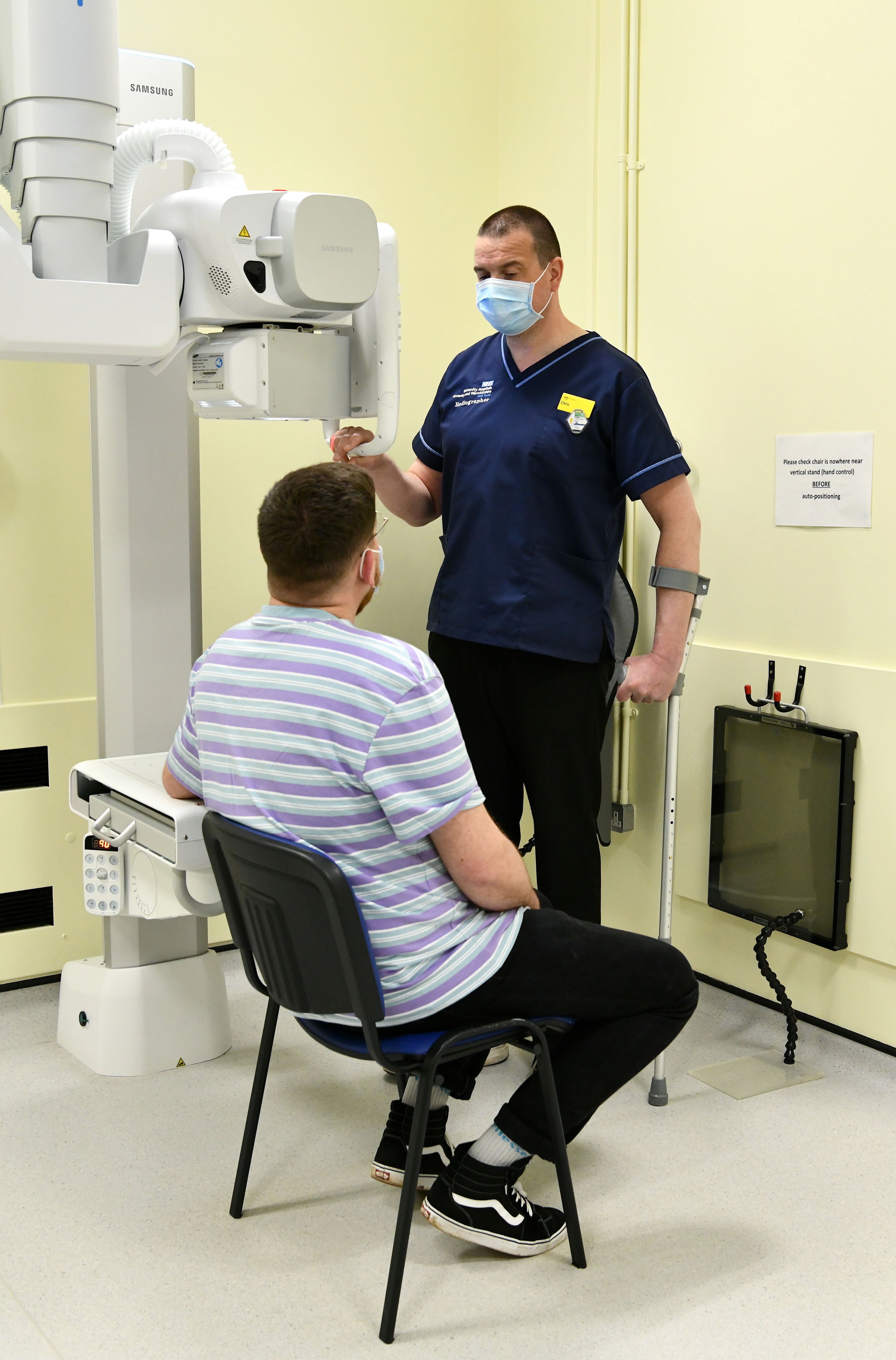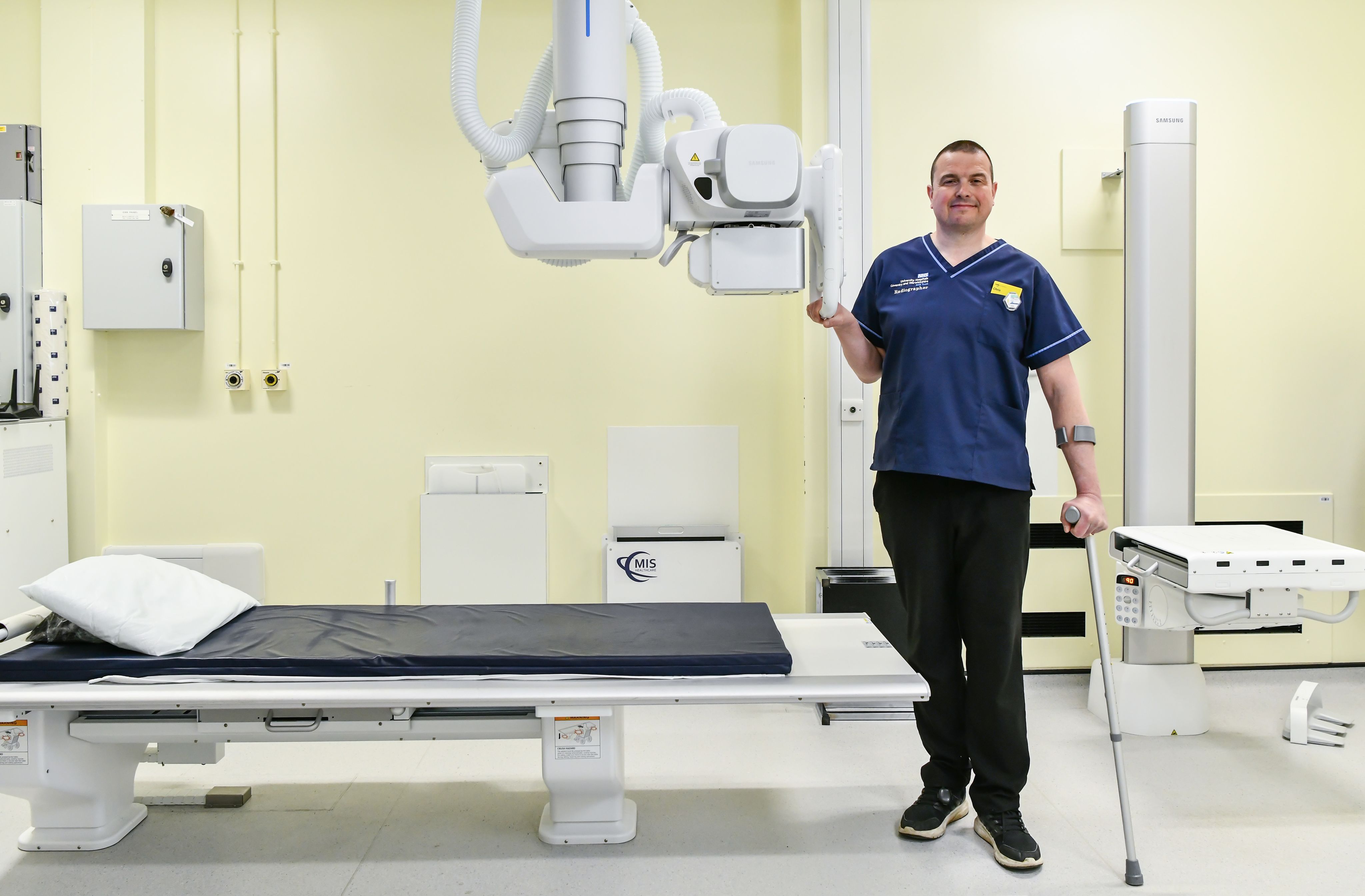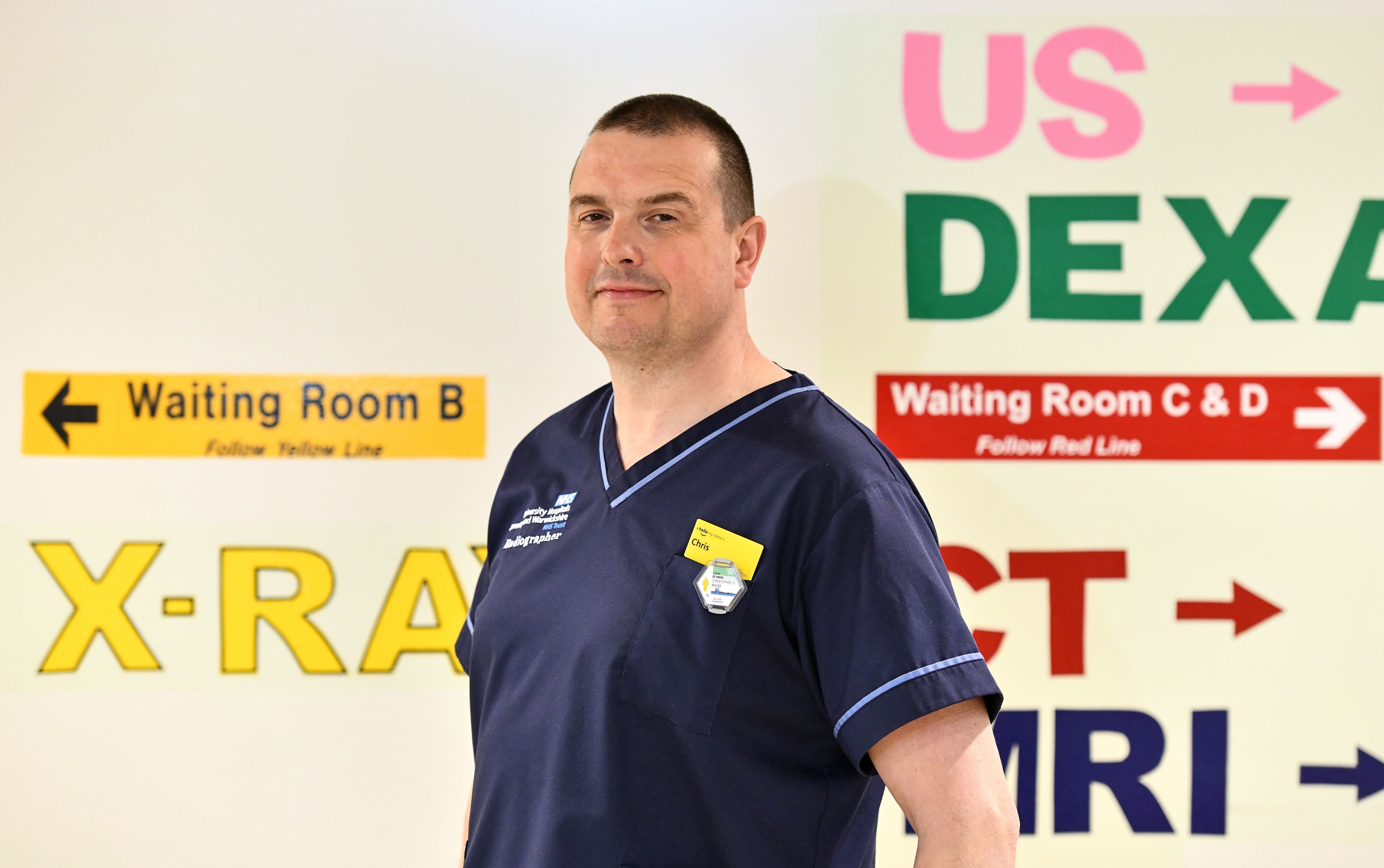
Professional
Working in radiography
with multiple sclerosis
How senior radiographer Chris Mayer is continuing his career despite being diagnosed with MS
Chris Mayer lost his sight in one eye in 2012 but experienced no further symptoms of multiple sclerosis (MS) until six years later. “I had no visible disability until I developed a mysterious limp in 2018, and then I was diagnosed with MS,” he says.
As a senior Band 6 radiographer at the Hospital of St Cross in Rugby, Warwickshire, Chris enjoyed the physical side of the job and was still able to work without adapting his role. But when the Covid pandemic struck, he was classified as vulnerable and then his condition moved into the progressive stage.
“The MS started to shift into second gear and the disability slowly started to show,” he says. “So between 2020 and last summer, it went from no disability to walking with one stick and then two sticks, and now I'm using a mobility scooter when I'm at home.”
For Chris, the big change professionally was not being able to do theatre work. “As it progressed, I had to go to my manager to say that I was struggling,” he explains. “I used to love working in theatre – I went into radiography because I was interested in surgery. But late last year, I had to stop that because of things like the lead coats. It was just getting too much with the pain and the tiredness.”
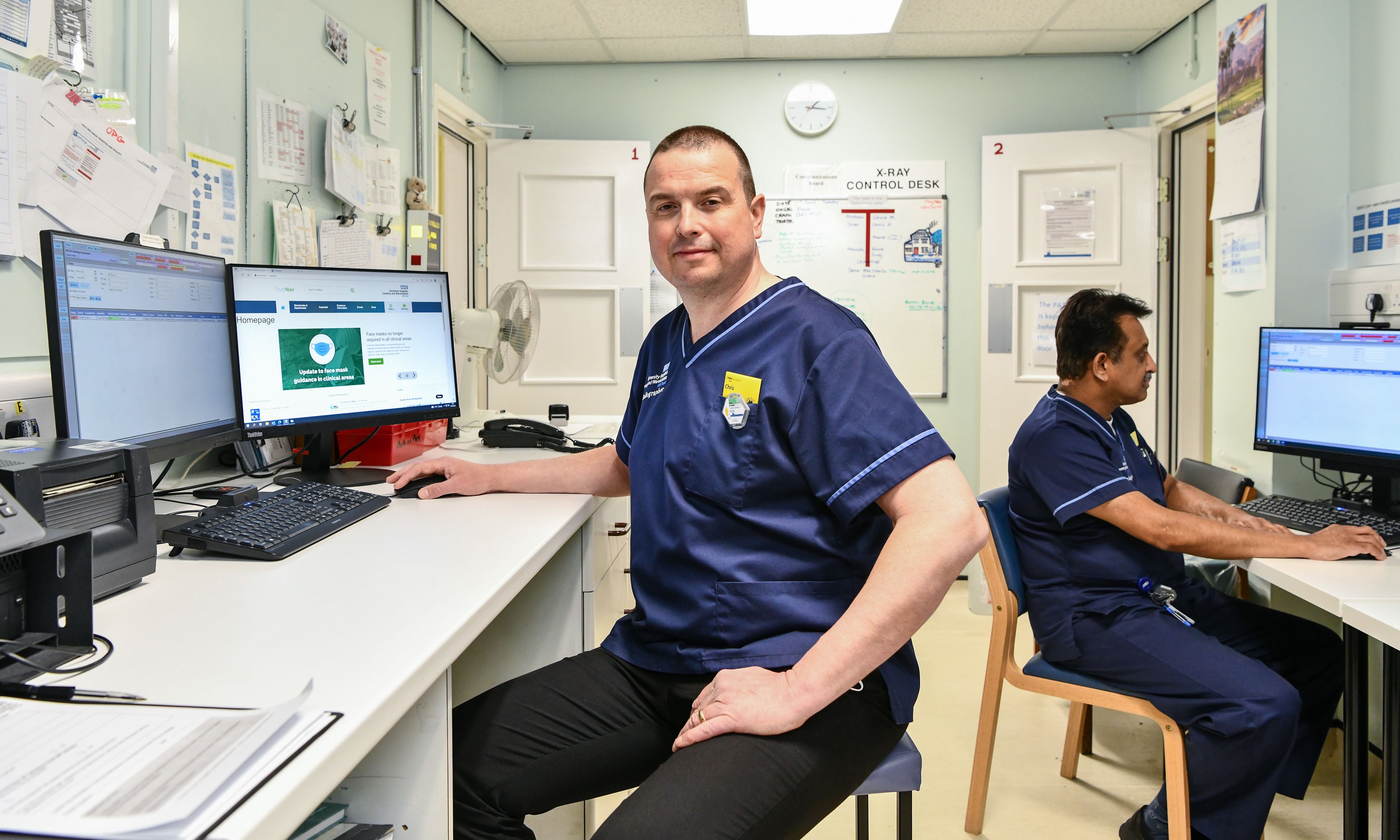
Chris has now reduced his working week to 30 hours, Monday to Thursday, and a workplace assessment has recommended numerous small adaptations to help him through the working day. “I can’t do anything too physical now, and I was advised not to do anything below waist height, such as knee X-rays, because bending down is too difficult.”
For someone who came late to radiography, the threat of early retirement on medical grounds is particularly difficult for Chris to accept: “I gave up everything to become a radiographer and go to university at 32.”
Chris worked in factories after leaving school – he was made redundant several times but managed to buy a house. “I wanted to do something with my life, have a career,” he says. He took a two-year access course to earn the qualifications for a radiography degree, working in a warehouse during the day and studying at night. His degree course at Birmingham City University included a placement at the George Eliot Hospital in Nuneaton, where he later started his first post as a Band 5 radiographer in 2009.
“Looking back, I’m really proud of myself, having come from nothing to doing a job like radiography,” he says. “And when I’m helping first-year students, I realise how much I’ve learned and can pass on to them – all that knowledge that has become second nature over the years.”
Chris’s manager, lead radiographer Julie Rendell, has focused on developing his teaching role as one way to reduce the more physical aspects of the job. “Julie has been very supportive. We have three apprentices joining the hospital in May and I have the role of mentoring them. It’s all about equipping me for more of a sit-down role and trying to future-proof where possible.”
Chris with his manager, lead radiographer Julie Rendell
Chris with his manager, lead radiographer Julie Rendell
Julie is in her first management post. Her predecessor, Chris’s previous manager, established his initial support. However, his condition has since declined and his needs have changed. She says: “It’s primarily been about learning how to support Chris, knowing what to say, and putting the correct policies in place to make sure he feels that he is valued, which he certainly is.
“I’ve relied heavily on the occupational health team in the trust, who have been amazing. And Chris has massively educated me about MS. I knew what it was but never fully appreciated the complexity of the condition, and the fact that it affects the brain as much as the physical side.”
Disability awareness training has been organised to help colleagues understand the less obvious problems of working with a debilitating condition. The trust has also organised four one-hour sessions for Chris to help him better manage his condition in the workplace.
“I'm not the old Chris. I can’t do the things I used to be able to do. And I have off-days when the fatigue really hits and I need a place to sit and rest on a comfortable seat, have a break and maybe finish work early,” he explains.
Julie says: “The training is something we should all benefit from. We deal with disability every day in our jobs but having a colleague with a disability is a different challenge. And MS is a condition that can change from day to day, and even from morning to afternoon, so it can be difficult for colleagues to comprehend.”
“We want to support Chris for as long as we can”
Every four weeks, Chris undergoes infusion therapy to reduce inflammation and slow the progression of his MS. By that time of the month, the symptoms will worsen and Chris will be feeling increased pain and fatigue, making work more difficult.
He says: “It’s quite a lonely life in radiography with MS, trying to understand your own limitations and helping others to understand as well. The hardest part is helping people to understand how people like me work with a chronic disability. I’m almost embarrassed sometimes to tell people that I cannot do some things.”
Julie has encouraged Chris to be open about his condition. “He deals with a lot and is very resilient in his attitude to MS. I always say that he should be upfront and tell people, so they know where they stand – don’t be embarrassed. We can then show him that we do have his back and we want to support him for as long as we can in the workplace.”
Chris has developed a precise routine to help him safely X-ray patients. “I use my two sticks to walk to the waiting room and call a patient for a wrist or chest X-ray. Once we’re there, I’ll then put one stick down and use the electrical stimulation on my leg to lift the foot affected by foot drop. Then I’ll ask someone to put the grid in and the person behind the screen will assist if necessary.”
What is multiple sclerosis?
MS is an autoimmune condition. The immune system malfunctions and attacks the myelin sheath that surrounds the nerves of the brain or spinal cord, slowing or disrupting the messages travelling along the nerves.
Most people with MS are diagnosed with the relapsing remitting type. They will have episodes of new or worsening symptoms, known as relapses, followed by periods of remission, which can last for years.
About two-thirds of people go on to develop secondary progressive MS, in which symptoms gradually worsen without obvious attacks. Some people continue to have infrequent relapses.
The symptoms, which vary widely from person to person and can affect any part of the body, include:
- Fatigue.
- Difficulty walking.
- Vision problems.
- Problems controlling the bladder.
- Numbness or tingling.
- Muscle stiffness and spasms.
- Problems with balance and coordination.
- Problems with thinking, learning and planning.
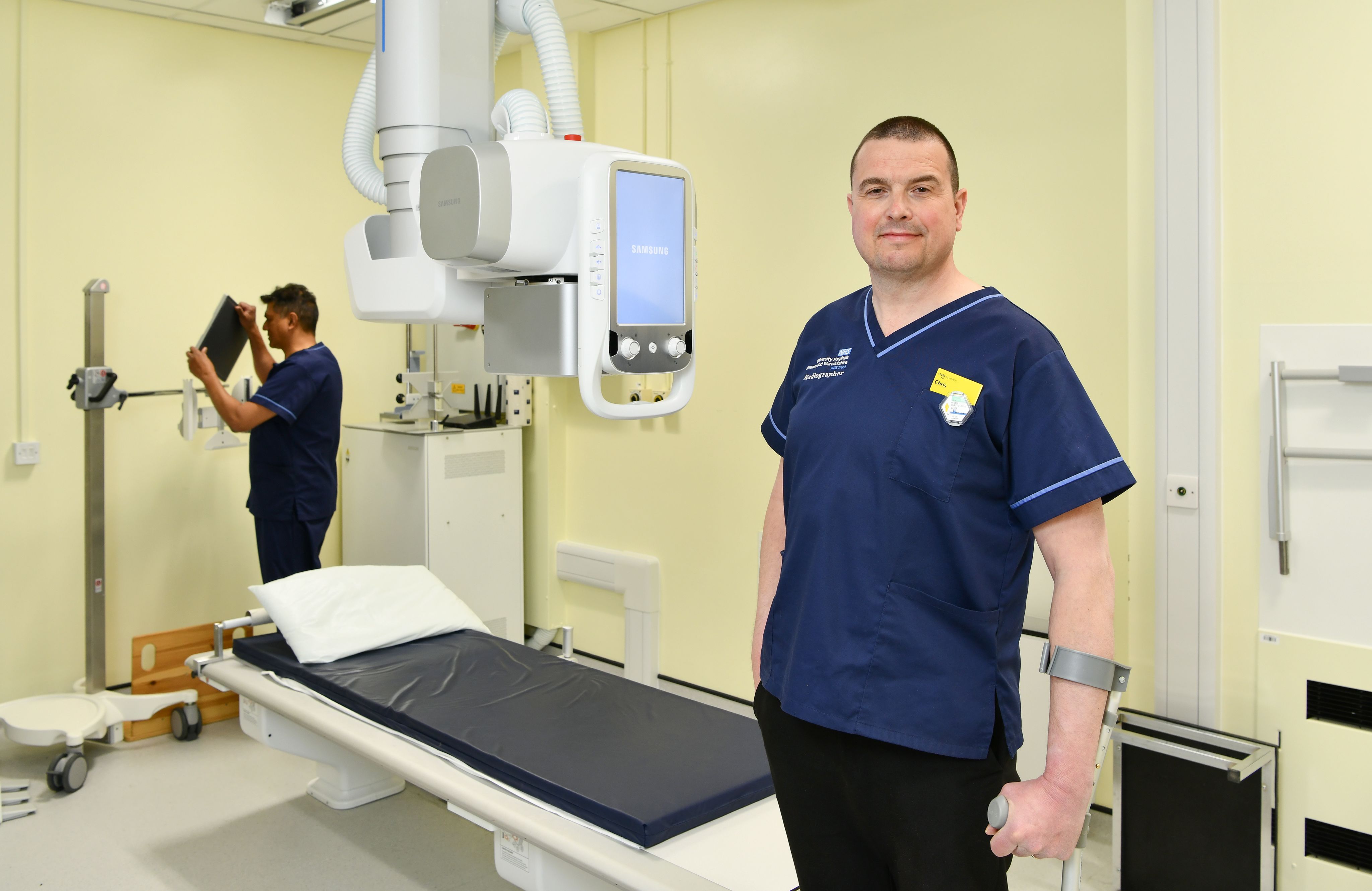
Living and working with MS has made Chris more empathetic to patients with similar disabling conditions: “When you are in that position yourself, you naturally feel more empathy when you see a person struggling. You go the extra mile and try to make a positive difference.”
So far, Chris has only met one other healthcare professional with MS – a nurse recently approached him having just been diagnosed – and he is keen to get in touch with other radiographers with the condition to share support.
“MS is not a death sentence,” he says. “There is a lot of treatment out there now, and it’s not the gloom and doom scenario that you think it is when you are first diagnosed. But it’s completely normal to feel devastated – I certainly was. You feel like you are grieving for your old life when you didn’t have all this uncertainty. With time, things get better.
“Try to continue with a healthy lifestyle. Eat the right foods. Keep as physically active as possible and reach out to people, talk to people. I am hoping that, through this article, I will be able to help somebody in a similar position.
“The mistake I made at first was that I was almost ashamed of walking round with sticks. The main thing is to try to be open with people. Tell people when you are struggling, don’t struggle in silence.”
Find out more
The two main MS charities in the UK that can offer advice are the MS Society and the MS Trust.
MS information courtesy of the NHS.
Photography by Simon Hadley
Now read...



